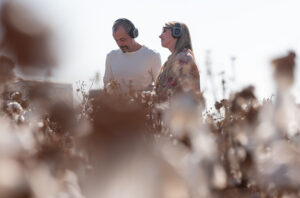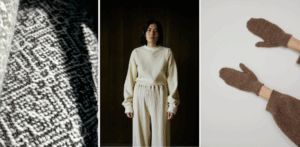2023 Wool & Fine Fiber Symposium Speakers
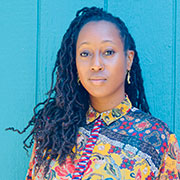 Teju Adisa-Farrar is a Jamaican-American environmental equity consultant and researcher. She centers climate, racial, and distributive justice by sharing ideas on regenerative practices and co-collaborative design. Teju uses a social geographies perspective encouraging us to think about space, place and identity. Teju’s lens includes sustainable fiber and fashion systems, urban ecologies, nature, Black history, activism and art. She supports people, collectives and organizations who are mapping / making alternative futures.
Teju Adisa-Farrar is a Jamaican-American environmental equity consultant and researcher. She centers climate, racial, and distributive justice by sharing ideas on regenerative practices and co-collaborative design. Teju uses a social geographies perspective encouraging us to think about space, place and identity. Teju’s lens includes sustainable fiber and fashion systems, urban ecologies, nature, Black history, activism and art. She supports people, collectives and organizations who are mapping / making alternative futures.
 Ayesha Barenblat is a social entrepreneur with a passion for building sustainable supply chains that respect people and our planet. With over 15 years of leadership to promote social justice and sustainability within the fashion industry, she founded Remake to mobilize citizens to demand a more just, transparent, and accountable fashion industry. Remake’s free educational resources, advocacy campaigns, and sustainable brands directory are focused on making fashion a force for good.
Ayesha Barenblat is a social entrepreneur with a passion for building sustainable supply chains that respect people and our planet. With over 15 years of leadership to promote social justice and sustainability within the fashion industry, she founded Remake to mobilize citizens to demand a more just, transparent, and accountable fashion industry. Remake’s free educational resources, advocacy campaigns, and sustainable brands directory are focused on making fashion a force for good.
Ayesha has worked across the public, private, and civil society sectors to promote the rights and dignity of the women who make our clothes. Prior to founding Remake, she led brand engagement at Better Work, a World Bank and United Nations partnership, to ensure safe and decent working conditions in garment factories around the world. Prior to this, she ran the fashion vertical at BSR, providing strategic advice to brands including Levi Strauss and Company, Marks and Spencer, Nike, and the Gucci Group on the design and integration of sustainability into business. She has a master’s degree in public policy from the University of California, Berkeley.
She counts both Karachi and San Francisco as her homes, and she is happiest when spending time with the women who bring our fashion to life and amplifying the stories of fashion’s most essential workers.
 Dr. Joanne Brasch holds a PhD in Textile Economics and Environmental Analysis from the University of California, Davis, where she also received a Master’s degree in Textile Science and a Bachelor’s degree in International Agricultural Development. With more than 13 years of academic work experience, Joanne has held lecturer and research appointments at UC Davis, CSU Sacramento, and Donghua University in Shanghai, China. She was the Sustainability Researcher for the UC Davis Health System, leading projects on waste mitigation and environmentally preferable purchasing on campus. Her topics of interest include global commodity systems, supply-chain sustainability, and environmental protection. She currently works as Special Project Manager at the California Product Stewardship Council (CPSC) and has worked for its national spinoff, the National Stewardship Action Council (NSAC), to lead projects that promote a circular economy using Product Stewardship and Extended Producer Responsibility (EPR).She presents to groups, large and small, regularly and leads public meetings in accordance with Bagley-Keeneas Dr. Brasch is appointed by California Department of Resources Recycling and Recovery (CalRecycle) to two advisory committees for carpet and mattress recycling with the position of Chair on both. She made Waste360’s “40 under 40” list for 2021.
Dr. Joanne Brasch holds a PhD in Textile Economics and Environmental Analysis from the University of California, Davis, where she also received a Master’s degree in Textile Science and a Bachelor’s degree in International Agricultural Development. With more than 13 years of academic work experience, Joanne has held lecturer and research appointments at UC Davis, CSU Sacramento, and Donghua University in Shanghai, China. She was the Sustainability Researcher for the UC Davis Health System, leading projects on waste mitigation and environmentally preferable purchasing on campus. Her topics of interest include global commodity systems, supply-chain sustainability, and environmental protection. She currently works as Special Project Manager at the California Product Stewardship Council (CPSC) and has worked for its national spinoff, the National Stewardship Action Council (NSAC), to lead projects that promote a circular economy using Product Stewardship and Extended Producer Responsibility (EPR).She presents to groups, large and small, regularly and leads public meetings in accordance with Bagley-Keeneas Dr. Brasch is appointed by California Department of Resources Recycling and Recovery (CalRecycle) to two advisory committees for carpet and mattress recycling with the position of Chair on both. She made Waste360’s “40 under 40” list for 2021.
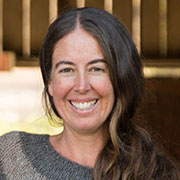 Rebecca Burgess is the Executive Director of Fibershed. She has two decades of experience working at the intersection of ecology, fiber systems, and regional economic development. She is the author of the best-selling book Harvesting Color, a bioregional look into the natural dye traditions of North America, and Fibershed: Growing a Movement of Farmers, Fashion Activists, and Makers for a New Textile Economy released in 2019. She has taught at Westminster College, Harvard University, and California College of the Arts. She also holds a new board position at the Livestock Conservancy and is serving on the leadership council of the Center for Regenerative Agriculture and Resilient Systems at Chico State University.
Rebecca Burgess is the Executive Director of Fibershed. She has two decades of experience working at the intersection of ecology, fiber systems, and regional economic development. She is the author of the best-selling book Harvesting Color, a bioregional look into the natural dye traditions of North America, and Fibershed: Growing a Movement of Farmers, Fashion Activists, and Makers for a New Textile Economy released in 2019. She has taught at Westminster College, Harvard University, and California College of the Arts. She also holds a new board position at the Livestock Conservancy and is serving on the leadership council of the Center for Regenerative Agriculture and Resilient Systems at Chico State University.
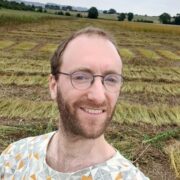 Nick Evans is a fashion designer, maker, software engineer and activist. At Fantasy Fibre Mill he works on small scale, open source textile processing machinery to enable the emergence of community owned local supply chains for natural fibre based textiles. With clothing brand First Principals he works downstream of these supply chains, making workwear inspired linen clothing. He teaches sewing and pattern cutting and helps coordinate the activities of Fibreshed Scotland.
Nick Evans is a fashion designer, maker, software engineer and activist. At Fantasy Fibre Mill he works on small scale, open source textile processing machinery to enable the emergence of community owned local supply chains for natural fibre based textiles. With clothing brand First Principals he works downstream of these supply chains, making workwear inspired linen clothing. He teaches sewing and pattern cutting and helps coordinate the activities of Fibreshed Scotland.
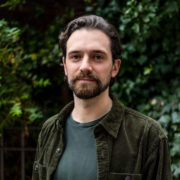 George Harding Rolls works as Eco-Age’s Director of Policy & Advocacy, running the organization’s work on pushing for the equitable phase out of fossil fuels from fashion. Previously he was with the Changing Markets Foundation, a Dutch non-profit formed to accelerate solutions to sustainability challenges by leveraging the power of markets, where he ran several hard-hitting corporate investigations pushing for accountability and advocating for legislative change. He led the campaign exposing the industry’s environmentally disastrous reliance on fossil fuels during the climate crisis as well as the organization’s greenwash.com project. Prior to Changing Markets, George has worked across the civil society sector with a focus on strategic communications, working for Forum for the Future, for Beijing-based philanthropic advisors, Charitarian, and for leading digital agency, Jellyfish. George is also an advisory board member of the Conscious Advertising Network.
George Harding Rolls works as Eco-Age’s Director of Policy & Advocacy, running the organization’s work on pushing for the equitable phase out of fossil fuels from fashion. Previously he was with the Changing Markets Foundation, a Dutch non-profit formed to accelerate solutions to sustainability challenges by leveraging the power of markets, where he ran several hard-hitting corporate investigations pushing for accountability and advocating for legislative change. He led the campaign exposing the industry’s environmentally disastrous reliance on fossil fuels during the climate crisis as well as the organization’s greenwash.com project. Prior to Changing Markets, George has worked across the civil society sector with a focus on strategic communications, working for Forum for the Future, for Beijing-based philanthropic advisors, Charitarian, and for leading digital agency, Jellyfish. George is also an advisory board member of the Conscious Advertising Network.
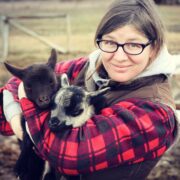 Anna Hunter is a first generation sheep farmer and wool mill owner in Eastern Manitoba, Treaty One Territory. Anna, her husband Luke, and their two kids raise Shetland sheep and run the only wool mill in Manitoba. Anna is passionate about building community and connecting rural fibre farmers with urban consumers, fibre artists and crafters. Anna believes that regenerative agriculture and climate beneficial food and clothing is integral to moving forward as farmers, fibre artists and Manitobans. Anna is passionate about growing a vibrant Canadian wool industry and has recently published her first book Sheep, Shepherd and Land. Anna is co-director of the Pembina Fibreshed in Southern Manitoba. To learn more about Anna and her farm/wool mill, check out www.longwayhomestead.com
Anna Hunter is a first generation sheep farmer and wool mill owner in Eastern Manitoba, Treaty One Territory. Anna, her husband Luke, and their two kids raise Shetland sheep and run the only wool mill in Manitoba. Anna is passionate about building community and connecting rural fibre farmers with urban consumers, fibre artists and crafters. Anna believes that regenerative agriculture and climate beneficial food and clothing is integral to moving forward as farmers, fibre artists and Manitobans. Anna is passionate about growing a vibrant Canadian wool industry and has recently published her first book Sheep, Shepherd and Land. Anna is co-director of the Pembina Fibreshed in Southern Manitoba. To learn more about Anna and her farm/wool mill, check out www.longwayhomestead.com
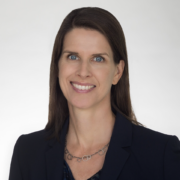 Sarah Kelley has been working at the intersection of food systems and fiber systems for over 20 years and has focused her work on raising funder and investor engagement in the fiber sector. Sarah is Principal of Common Threads Consulting, working with a range of funder and impact investor clients at the intersection of financing, equity, and sustainability, and she serves as consultant to Sustainable Agriculture and Food Systems Funders (SAFSF) for its Sustainable Fiber and Textiles initiative. Together with Teju Adisa-Farra, she is the Co-Managing Director of the Fibers Fund, designed to facilitate the investment of financial capital into a regenerative U.S. natural fibers and textile industry. Sarah was selected as a 2018-19 Just Economy Institute Fellow, focusing on integrating investment and grantmaking strategies to drive change in the U.S. sustainable textile field.
Sarah Kelley has been working at the intersection of food systems and fiber systems for over 20 years and has focused her work on raising funder and investor engagement in the fiber sector. Sarah is Principal of Common Threads Consulting, working with a range of funder and impact investor clients at the intersection of financing, equity, and sustainability, and she serves as consultant to Sustainable Agriculture and Food Systems Funders (SAFSF) for its Sustainable Fiber and Textiles initiative. Together with Teju Adisa-Farra, she is the Co-Managing Director of the Fibers Fund, designed to facilitate the investment of financial capital into a regenerative U.S. natural fibers and textile industry. Sarah was selected as a 2018-19 Just Economy Institute Fellow, focusing on integrating investment and grantmaking strategies to drive change in the U.S. sustainable textile field.
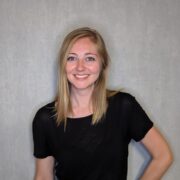 Rachel Kitchin is a Climate Campaigner for Fossil Free Fashion and IT at North American environmental NGO Stand.earth, working to kick fossil fuels out of the fashion and tech industries’ supply chains. Since 2017, Stand.earth has been changing the fashion industry by moving major brands to take industry-leading climate positions, and publishes the Fossil Free Fashion Scorecard to hold the sector to account. Rachel has been leading on Stand.earth’s fashion corporate advocacy work for over a year, following several years of experience in corporate and government advocacy on a wide range of important environmental issues, including pushing for better supply chain and waste management for the Canadian plastics industry.
Rachel Kitchin is a Climate Campaigner for Fossil Free Fashion and IT at North American environmental NGO Stand.earth, working to kick fossil fuels out of the fashion and tech industries’ supply chains. Since 2017, Stand.earth has been changing the fashion industry by moving major brands to take industry-leading climate positions, and publishes the Fossil Free Fashion Scorecard to hold the sector to account. Rachel has been leading on Stand.earth’s fashion corporate advocacy work for over a year, following several years of experience in corporate and government advocacy on a wide range of important environmental issues, including pushing for better supply chain and waste management for the Canadian plastics industry.
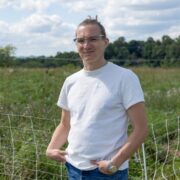 Jordon Masters is a member of the Central Appalachian Fibershed and a Research Assistant at West Virginia University. Their research involves fiber and textile design/research, natural dyes, and economic sustainability for small farmers. Together with other Fibershed Affiliates around the world, Masters has been researching the potential of open-source “micro-mills” as a value-added method to increase local textile production and increase profits for small farmers.
Jordon Masters is a member of the Central Appalachian Fibershed and a Research Assistant at West Virginia University. Their research involves fiber and textile design/research, natural dyes, and economic sustainability for small farmers. Together with other Fibershed Affiliates around the world, Masters has been researching the potential of open-source “micro-mills” as a value-added method to increase local textile production and increase profits for small farmers.
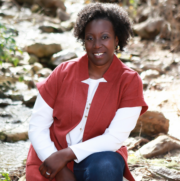 Tameka Peoples is a lifelong leader in the corporate and community service sector, she stared this journey in service ..to Country a disabled veteran with 10 years of service in the Air Force, a non-profit founder and advocate for her community. She founded Seed2Shirt- a program focus small batch vertically integrated ETHICAL apparel production company – Making Blank T-shirts from cotton sourced from African / African- American Farmers, and one of the only Black women owned cotton merchant companies on the market. Seed2Shirt work, centers Black cotton farmers globally particularly in West Africa and US, a percentage of all sales goes to their Farmer Enrichment program supporting the land and livelihoods of the farmers they source from.
Tameka Peoples is a lifelong leader in the corporate and community service sector, she stared this journey in service ..to Country a disabled veteran with 10 years of service in the Air Force, a non-profit founder and advocate for her community. She founded Seed2Shirt- a program focus small batch vertically integrated ETHICAL apparel production company – Making Blank T-shirts from cotton sourced from African / African- American Farmers, and one of the only Black women owned cotton merchant companies on the market. Seed2Shirt work, centers Black cotton farmers globally particularly in West Africa and US, a percentage of all sales goes to their Farmer Enrichment program supporting the land and livelihoods of the farmers they source from.
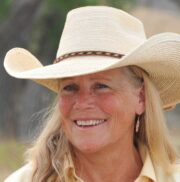 Wildlife ecologist Linda Poole works for the National Center for Appropriate Technology, providing producers with technical assistance in rangeland agroecology, livestock husbandry, biodiversity conservation, process-based restoration of grass- and wetlands, and community consensus building. Off hours, Linda raises colored crossbred finewool sheep, using them to restore vitality to a 320-acre prairie homestead in northcentral Montana. Her life’s work is fostering diverse partnerships to regenerate resilient human and natural communities essential to wisely stewarding our one precious planet. fiberpartnership.ncat.org soilforwater.org ncat.org
Wildlife ecologist Linda Poole works for the National Center for Appropriate Technology, providing producers with technical assistance in rangeland agroecology, livestock husbandry, biodiversity conservation, process-based restoration of grass- and wetlands, and community consensus building. Off hours, Linda raises colored crossbred finewool sheep, using them to restore vitality to a 320-acre prairie homestead in northcentral Montana. Her life’s work is fostering diverse partnerships to regenerate resilient human and natural communities essential to wisely stewarding our one precious planet. fiberpartnership.ncat.org soilforwater.org ncat.org
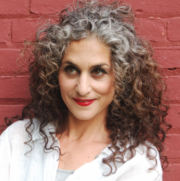 Laura Sansone is a textile designer, activist, and consultant. She is the creator of NY Textile Lab, a design and consulting company that supports environmentally responsible textile methods, and regional systems of production. Laura is currently a Part-Time Assistant Professor of Textiles at Parsons School of Design. She has developed initiatives that bring NY designers and farmers together with the goal of creating a decentralized, regenerative textile supply network. Textile Lab’s NYS Regional Yarn Sourcebook is a collection of locally sourced and produced yarns that are intended to link apparel, product and interior designers to the regional network of farms and fiber processing mills. She is the founder of the Carbon Farm Network, a purchasing cooperative that connects designers to Climate BeneficialTM fibers that are grown on NYS farms practicing Carbon Farming on their lands. In addition, she has designed woven textiles for the following companies: Maharam, New York, NY, American Silk Mills, New York, NY and Burlington House Fabrics.
Laura Sansone is a textile designer, activist, and consultant. She is the creator of NY Textile Lab, a design and consulting company that supports environmentally responsible textile methods, and regional systems of production. Laura is currently a Part-Time Assistant Professor of Textiles at Parsons School of Design. She has developed initiatives that bring NY designers and farmers together with the goal of creating a decentralized, regenerative textile supply network. Textile Lab’s NYS Regional Yarn Sourcebook is a collection of locally sourced and produced yarns that are intended to link apparel, product and interior designers to the regional network of farms and fiber processing mills. She is the founder of the Carbon Farm Network, a purchasing cooperative that connects designers to Climate BeneficialTM fibers that are grown on NYS farms practicing Carbon Farming on their lands. In addition, she has designed woven textiles for the following companies: Maharam, New York, NY, American Silk Mills, New York, NY and Burlington House Fabrics.
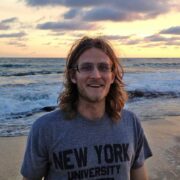 Branson Skinner is an American educator, farmer, urban planner and musician. He has led small and large-scale organic farming operations and supply chains, open-source coding initiatives, a fair trade fashion cooperative, cross-border educational collaborations, documentary projects and music videos. Through his work since co-founding The Or Foundation with his partner Liz Ricketts, Branson has helped bring global awareness to fashion’s waste crisis through extensive research into the secondhand clothing trade as it manifests in Accra, Ghana, home to the largest secondhand clothing market in the world. Based in Accra, The Or Foundation puts the lessons of this on-going research into action by advocating for Globally Accountable Extended Producer Responsibility (EPR) as textile EPR programs take shape across Europe and California, and by operating at the intersection of education, environmental Justice and fashion development to foster holistic, community-led waste transformation pathways, to conduct crisis relief efforts, environmental research and remediation programs, and to support job training and community infrastructure for a Justice-led circular economy as a model of what is possible through Globally Accountable EPR. Branson studied Globalization of Public Health and Societies at NYU Gallatin, where he was a Reynolds Scholar for Social Entrepreneurship. He also holds a Masters of Community Planning degree from the University of Cincinnati.
Branson Skinner is an American educator, farmer, urban planner and musician. He has led small and large-scale organic farming operations and supply chains, open-source coding initiatives, a fair trade fashion cooperative, cross-border educational collaborations, documentary projects and music videos. Through his work since co-founding The Or Foundation with his partner Liz Ricketts, Branson has helped bring global awareness to fashion’s waste crisis through extensive research into the secondhand clothing trade as it manifests in Accra, Ghana, home to the largest secondhand clothing market in the world. Based in Accra, The Or Foundation puts the lessons of this on-going research into action by advocating for Globally Accountable Extended Producer Responsibility (EPR) as textile EPR programs take shape across Europe and California, and by operating at the intersection of education, environmental Justice and fashion development to foster holistic, community-led waste transformation pathways, to conduct crisis relief efforts, environmental research and remediation programs, and to support job training and community infrastructure for a Justice-led circular economy as a model of what is possible through Globally Accountable EPR. Branson studied Globalization of Public Health and Societies at NYU Gallatin, where he was a Reynolds Scholar for Social Entrepreneurship. He also holds a Masters of Community Planning degree from the University of Cincinnati.


